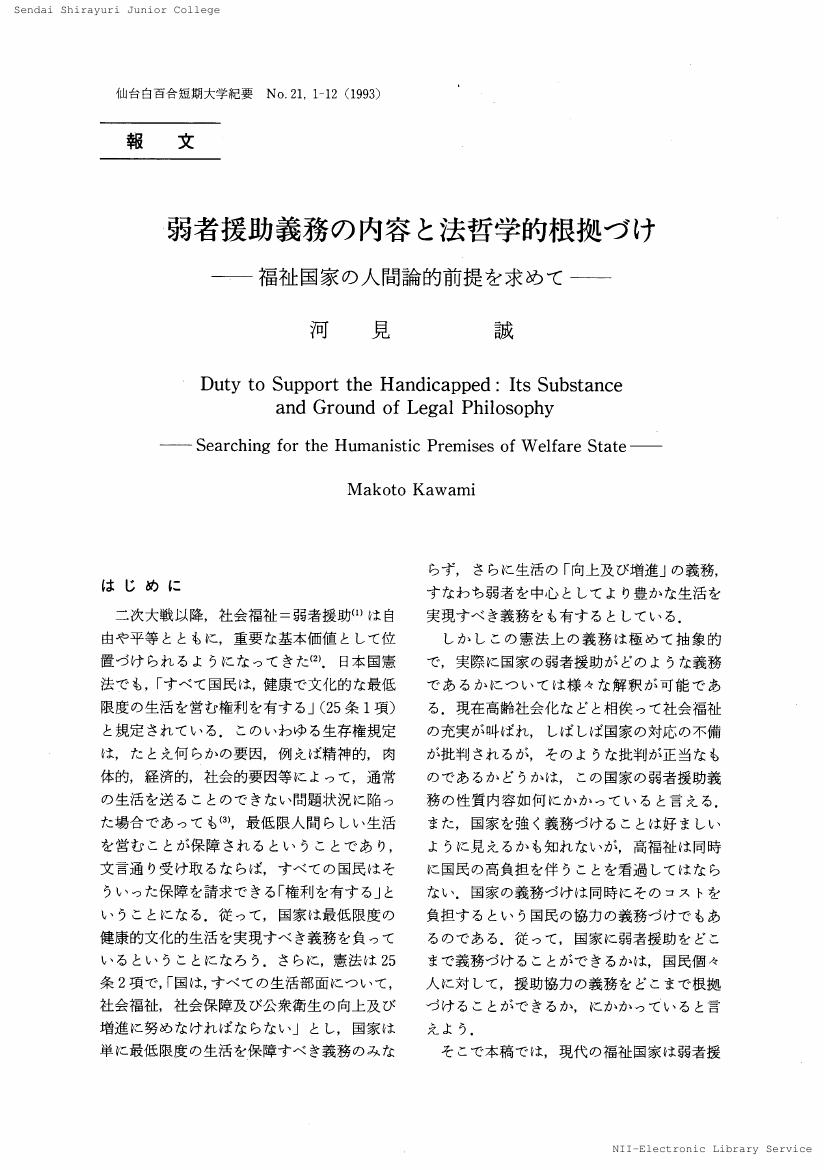4 0 0 0 OA <報文>弱者援助義務の内容と法哲学的根拠づけ : 福祉国家の人間論的前提を求めて
- 著者
- 河見 誠
- 出版者
- 学校法人白百合学園 仙台白百合短期大学
- 雑誌
- 仙台白百合短期大学紀要 (ISSN:02864924)
- 巻号頁・発行日
- vol.21, pp.1-12, 1993 (Released:2018-07-16)
2 0 0 0 OA トマス・アクィナス哲学から見た近代法思想
- 著者
- 河見 誠
- 出版者
- 日本法哲学会
- 雑誌
- 法哲学年報 (ISSN:03872890)
- 巻号頁・発行日
- vol.2007, pp.14-26, 2008 (Released:2021-03-31)
Thomas Aquinas is said to be not only the greatest medieval philosopher, but also the first modern figure. He put autonomic reason and the human being at the starting point of understanding being and belief. However, his attempt was persistently a compilation of ancient and medieval thoughts, therefore his concepts of autonomy of reason and humanity, which seemed quite modern and yet were quite different from those of the modern era onwards. I will focus on these differences and search into what the modern era cuts off from the medieval concept of reason and the image of human beings compiled by Thomas. Through this inquiry, we will uncover the points which we should reconsider modern legal thought. According to Thomas, autonomy of reason means that reason can grasp being and essence by its own power. However, reason presupposes them both when it works. Truth in speculative reason is conformity of intellect and thing. Moreover, truth in practical reason is conformity of intellect and right appetite, that is, will. Being and reason are not in a one-way, linear relation, but in a two-way, circular relation. From being to reason, reason to will, will to being. From the perspective of such a circular development, the character or position of the human being would be as follows : “incompleteness,” “just a part of being order,” “having a role in realization of being” (from possibility to reality), “trial and error in the process of human activity.” The modern era requires law and legal thought as normative support for breaking the connec tive ring of being, reason, and will. If such modern efforts bring about the opposite human character or position, that is, “human unrestrainedness,” “lack of holistic perspective in under standing being,” “loss of objective purpose,” “arbitrary action and perception,” and such character or position causes a huge distortion to humanity, society and nature, law and legal thought should enter the process of connecting the circular ring. This is what Thomas Aquinas’ philosophy would suggest.
- 著者
- 河見 誠
- 出版者
- 学校法人白百合学園 仙台白百合短期大学
- 雑誌
- 仙台白百合短期大学紀要 (ISSN:02864924)
- 巻号頁・発行日
- vol.21, pp.1-12, 1993
- 著者
- 河見 誠
- 出版者
- 日本法哲学会
- 雑誌
- 法哲学年報 (ISSN:03872890)
- 巻号頁・発行日
- vol.1994, pp.137-144, 1995-10-30 (Released:2008-11-17)
- 参考文献数
- 5
- 著者
- 河見 誠
- 出版者
- 青山学院女子短期大学
- 雑誌
- 青山學院女子短期大學紀要 (ISSN:03856801)
- 巻号頁・発行日
- vol.56, pp.105-128, 2002-12-10
From the 1990s the "New Civic Society" which is diffent from the market society becomes the focus of public attention. The "New Civic Society" is composed of various associations and communities including NPO, NGO, volunteer groups, ecology movements, etc. The reason why many people pay attention to the "New Civic Society" is their expectations for it to open not only a new development in politics but also a public space for human flourishing. Then what role does law play in this "New Civic Society" movement? "Republicanism" insists that law makes possible and activates communications in the New Civic Society. Therefore law is the basis for politics and human flourishing in the new era. Criticizing republicanism thoroughly, Emilios A. Christodoulidis insists that law pauperises politics and excludes many human (anguished) voices. Instead of law, he proposes "Reflexive Politics" which activates politics and human activities. His theory is based on "contingency" and "self-reference" so as to "remain free to contest." I think Christodoulidis' criticism of republicanism is to the point, but reflexive politics does not bring about open public sphere, non-exclusive human relationships. This is because the theory presupposes "passion"-based human relationships. I will propose politics (or love) as "corn-passion" instead of politics (or love) as "passion." I think "compassion"-based human relationships will certainly open the possibility to "remain free to contest." A theory based on "compassion" would restore the world of ethics, and it would try not to exclude law and politics from the world of ethics, but to locate them in the world of ethics. We can name it "Natural Law Theory as Compassion." This theory is worth studying as a philosophy of law for the "New Civic Society."


